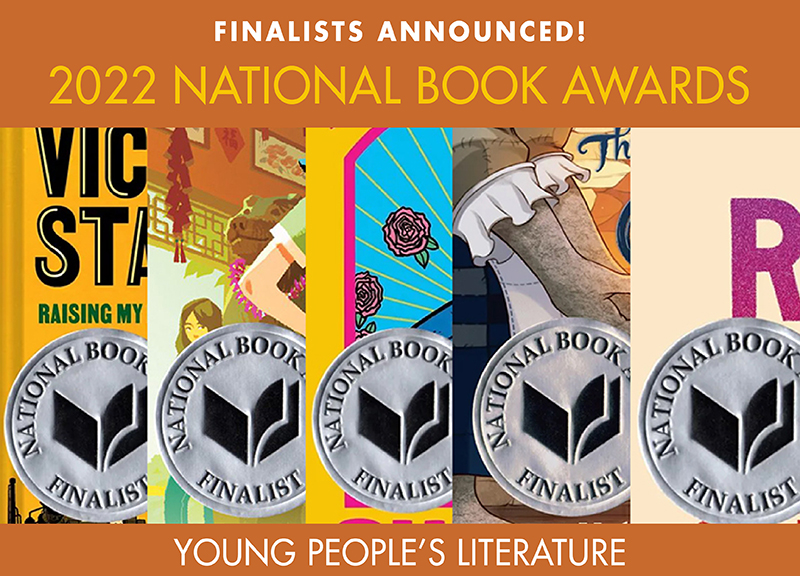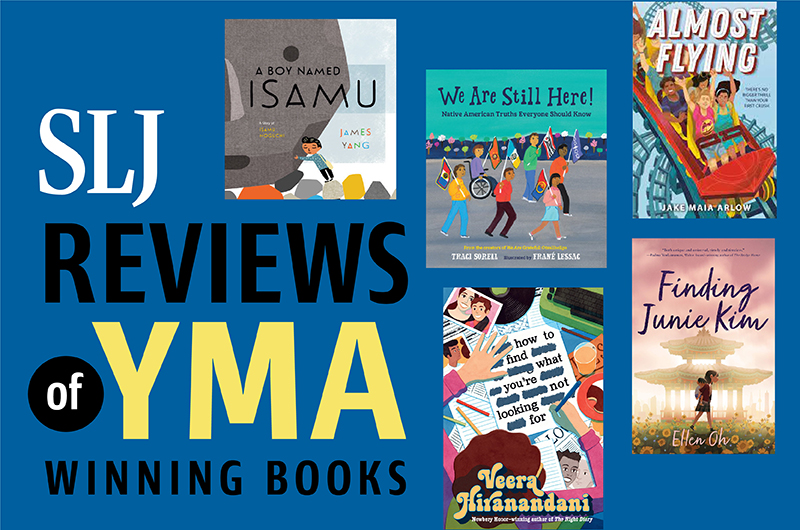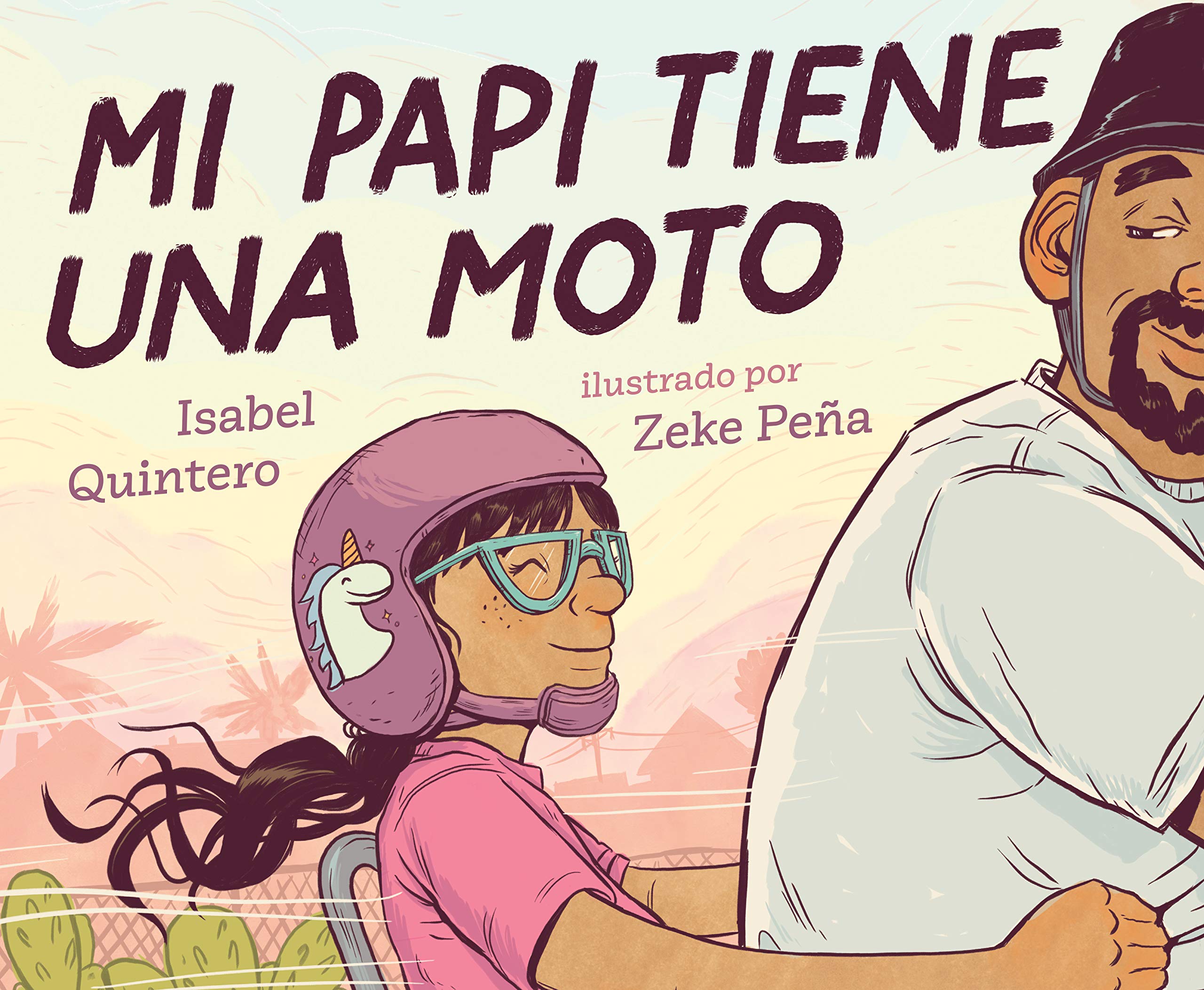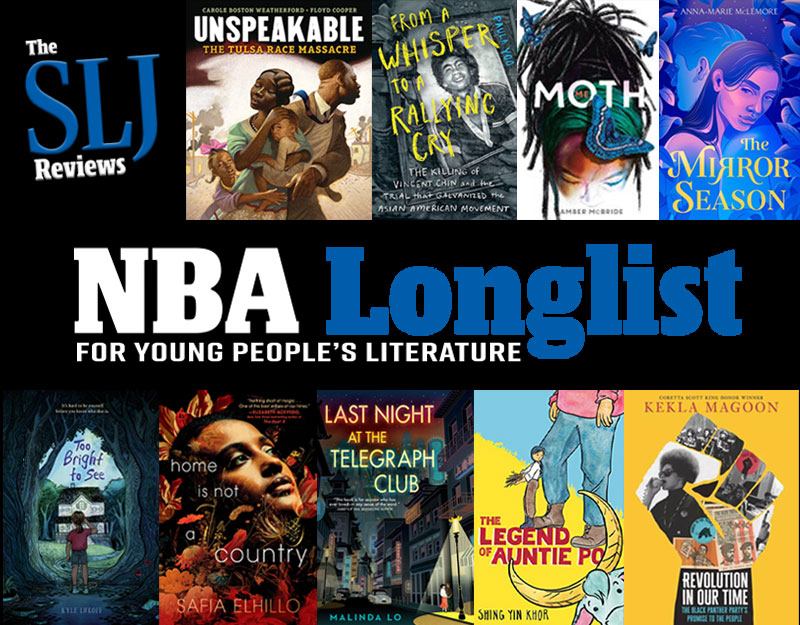Heavy Medal Finalist – Refugee
Long List T itle: REFUGEE
itle: REFUGEE
(Titles on our long list will be included in our online conversation and balloting, alongside the short list titles.)
Alan Gratz’s novel received six nominations on this blog, which puts in up near the leaders. I find it especially strong in “presentation of themes.” The three separate, but related stories all throw readers right into the heart of suspenseful and thought-provoking situations with families fleeing their homes and facing all kinds of danger and uncertainty. Plot development is tricky, with abrupt shifts from one story to the next, and I think he does a good job of pacing. Something important happens in each chapter and all three stories keep moving forward. He weaves the historical background of each setting into the narratives fairly smoothly, although since each story is from a single point of view, that context is occasionally a little forced. The main characters are not truly distinct or memorable, but I’m not sure that’s needed for this book. The circumstances and events are so central, you could argue that more restrained character development is appropriate given the plot and themes.
I also respect the ways that “the book displays respect for children’s understandings, abilities, and appreciations.” [Newbery Terms and Criteria] There are complex issues, three points of view, three separate (but connected) time periods, and a mix of fictional characters with historical events. That’s a lot for a fifth grade reader to keep track of, and I think the author does a good job of carefully conveying narrative and themes in ways that are accessible to upper elementary and middle school age readers.
ADVERTISEMENT
ADVERTISEMENT
I didn’t nominate this book, but I see enough strengths that I could be convinced to reassess, so I’m very interested in hearing more about it…
Filed under: Book Discussion
About Steven Engelfried
Steven Engelfried was the Library Services Manager at the Wilsonville Public Library in Oregon until he retired in 2022 after 35 years as a full-time librarian. He served on the 2010 Newbery committee, chaired the 2013 Newbery Committee, and also served on the 2002 Caldecott committee. You can reach him at sengelfried@yahoo.com.
ADVERTISEMENT
ADVERTISEMENT
SLJ Blog Network
Name That LEGO Book Cover! (#53)
Cover Reveal and Q&A: The One and Only Googoosh with Azadeh Westergaard
K is in Trouble | Review
Fighting Public School Book Bans with the Civil Rights Act
Take Five: Middle Grade Anthologies and Short Story Collections
ADVERTISEMENT








One of the things I find intriguing about Refugee is the cyclical nature of the events. In 1938, Josef and his family are escaping from Germany to Cuba. Then in 1994, Isabel and her family are escaping FROM Cuba to Florida. Paradoxically, in 2015 Mahmoud and his family are escaping from Syria TO Germany.
This observation by Mahmoud is indicative:
“…Berlin had been all but destroyed by the end of World War II, reduced to a pile of rubble like Aleppo was now. Would it take another seventy years for Syria to return from the ashes the way Germany had?” (p. 311)
To me (the child of German Jews), Germany’s “return from the ashes” is way, way, way more than physical. In fact, this line troubles me if readers equate two totally different reasons for fleeing. Of the three story-lines, only one is about ethnic cleansing (the Holocaust).
Further thinking that “return from the ashes” is an unfortunate metaphor for Germany (crematoriums anyone?) .
I’m not sure what I think of this title yet. My very rough impression is that it can’t decide whether it wants to be a fiction story or a nonfiction text. Sometimes, I feel like Gratz sets his characters up for situations solely to inform the reader of some background history. I guess I don’t feel like he weaves the historical information into the narrative as smoothly as some might argue.
Here’s an example from very early in the text. Josef’s story starts with this third person limited point of view, describing in horrifying detail Josef’s home being invaded and his father being carried away. This reads like a work of historical fiction. But… then on page 5, we get this: “In the days to come, Josef learned that his family wasn’t the only one the Nazis had attacked that night. Other Jewish homes and businesses and synagogues were destroyed all over Germany, and tens of thousands of Jewish men were arrested and sent to concentration camps. They called it Kristallnacht, the Night of Broken Glass.”
Now we’ve shifted to this informative third person omnisicient point of view. There’s no way that Josef could have possibly learned that tens of thousands of men had been arrested that night. I would even question if in the immediate days, a name had been given to this particular night. This is information historians have gathered. Josef as a boy would not have known this, would he?
Another example is Josef’s father. There are times he’s referred to as Josef’s father. There are times he’s referred to as “papa.” Quite often though, he’s referred to by his first and last name. “Aaron Landau.” I didn’t understand this.
I know we’re not really supposed to discuss what a book is NOT, but by doing so I guess we can get at how a book isn’t “distinguished.” I wonder if this would have been more effective if Gratz would have created a work of nonfiction and done the research to follow three particular real life refugees instead of creating fictional characters based on situations he had researched. Because he has to spend so much time interrupting his fictional story to share information. Or, go all in on the narrative and don’t worry so much about the background information. I’m not sure some of the characters would have that information in their settings anyway. Provide the necessary background information in an Author’s Note. Then the narrative could fully stand out and develop.
Personally, I think the writing and description is very straight forward. “Fatima had long, dark hair she wore up on her head, and intense brown eyes. Today she was wearing her usual around-the-house attire: jeans and a pink nurse’s shirt she used to wear to work.” I don’t know if that’s a good example or not, but many details like this are just spelled out for us instead of inferred. It doesn’t scream “distinguished” to me, but given the intended audience, maybe I’m being too harsh.
Still thinking about this in Newbery terms…
Since Gratz has chosen to take lots of real life happenings and impose them on fictional characters, the text would appear to be more focused on what is happening to these characters than how the characters are responding to what is happening to them. I guess I would say that this is a more plot-driven book than a character-driven book.
So in terms of Newbery deliberations, we need to focus on what the book is. It doesn’t have to exhibit distinguished features in all the criteria, just the criteria pertinent to it. This style of narrative, the delineation of this plot, should be very distinguished. I think the short chapters and jumping from time period to time period does not allow a reader to feel the suspense the way it was intended. To do that, I think a reader needed to be immersed in each storyline for a longer period of time. (I’m thinking of ECHO, but I know I can’t compare this to that in a Newbery discussion). I think this book has proper intentions, but doesn’t read as suspenseful as it should. It reads a bit chaotic.
Also, as I read a little further, I think the shift in point of view that I mentioned earlier, evens out and becomes more third person limited, so my observation of that really only applies to the beginning of the story.
Good point, Mr. H, about the short chapters affecting the level of suspense. One Mahmoud chapter ends with the family finally finding a boat to leave Turkey:
“…when they pulled to a sotp, they were all quiet as they stared.
This time, finally, a boat was there. (p 128)
Then you jump to a Joseph chapter (doctor’s inspection, Joseph slaps father), then an Isabel (she rescues Senor Castillo from the ocean), then resumes with Mahmoud:
“God help us – That is what we’re to ride in?” Mahmoud’s father said.
The boat wasn’t a boat. It was a raft. (p 141)
Mahmoud’s family goes from hope to crushing disappointment in a single moment as they see the boat, but readers jump away for thirteen pages, with a lot more stuff happening, before they complete that shift. I’m not sure, but I bet when I got to page 141, I turned back to 128 to reset that scene and get the full impact.
DaNae cites HELLO, UNIVERSE as a multiple narrative book with better characterization. It’s also interesting to compare plot development between those two. HELLO moves forward much more deliberately, and I struggled with that for a bit. But I got more engaged as the story continued, and the connections became clearer. Transitions from one pov to the next were smoother, but that makes sense, since it’s about kids in the same time and place, vs. the separate eras and geographies of REFUGEE.
Interesting comment, Mr. H. While I do know that my mother definitely knew about Kristallnacht the next day (she was a child in Berlin and told me of seeing the big synagogue in flame), I don’t know how quickly they all knew how extensive it was. I actually think the quote Kate gave above about Berlin provides an even better example. Would Mahmoud know this? That Berlin ended up so destroyed and that it was 70 years later. I’m dubious as to how many kids all over the world would. I could ask my students and I’m sure they’d have no clue. (BTW, Berlin’s major rebuilding has been post-Cold War not post-WWII).
He does the same thing by mentioning the “Wet Foot Dry Foot” policy… He interrupts Isabel’s narrative to provide the reader background knowledge on this policy, even naming it in the story. But Isabel’s narrative is set in 1994 and the policy wasn’t even named “Wet Foot Dry Foot” until 1995, according to his notes in the back of the book. So Isabel, in 1994, would have never heard of this, at least by name. So why mention it by name? It’s completely plausible that her family had heard stories of what the US was doing with refugees from Cuba, but to drop this information into this particular spot of the narrative just seemed a bit off.
Like Monica’s mother, my grandmother is German and was living in the northeast area of the country (what is now Poland). She, too, remembers Kristallnacht, and knowing about it, if not the day after, then very soon after. I agree with you, though, Jordan, that this factoid seems shoehorned into the narrative.
In fact, much of this book had the stench of Instruction looming over it. Gratz is clearly passionate about the topic and his intentions are undoubtedly noble. I fear, though, that he was unable to extract his personal attachment to this topic from the writing, which often lacked nuance. Authors often play with time and chronology in order for the narrative to work. This technique usually doesn’t bother me, but in a book that already relied heavily on coincidence, it felt like Too Much.
The cheesiness of the ending didn’t work for me, either. Multiple narratives can be married together in satisfying ways (2016’s SALT TO THE SEA; 2015’s ECHO), but REFUGEE just fell flat for me. A timely and important book to be sure, but, like AMINA’S VOICE, littered with too many literary issues to rise above its message.
I think I’m echoing Steven here, when I say that the strength of this book is that it introduces middle-grade readers to the horrors of the refuge experience, without crossing the line of what would be too harsh for the age. It perfectly meets their understanding.
I also, don’t find the characterization particularly compelling. The choppiness of the delivery may have hurt it, but I have seen better characterization in multiple narratives, HELLO, UNIVERSE.
I am happy that I have this book for my students, but I don’t find it rises to most distingused.
I feel that the story is both horrifying and touching because of the VERY large amount of people that die and how the different story’s connect to each other. Also the fact that the police in Cuba weren’t letting the German family in is so terrible and unfair. (Code word S.A.)
And if some one like Donald trump we’re to read this he might realize that people suffer from what he does.
I found the broken up parallel stories very hard to read. Just as I got into one character’s situation, I would be in a different time and place – every 5 or 6 pages. I finally read Josef all the way through and then Isabel and then Mahmoud. The interrupted plot did not work for me. And I agree that this is primarily a plot driven book.
I also found the constant changes in POV surprisingly disorienting. You’d think the short chapters with cliffhangers would build suspense, but it lessened it instead. I agree that the prose is just OK and it’s sometimes awkward or confusing. And I very much agree with Mr. H about the name changes–that drove me absolutely insane! I had no idea who Aaron Landau was the first time he was introduced that way.
Like THUG, this is an issue book. And it’s an important issue and I’m sure the book will be very helpful for teachers. I think it does a better job presenting its issue/theme than THUG does. In spite of the extra history stuck in that Mr. H points out, I think it does mostly explore it through story rather than lecturing. I don’t think it does a very good job of giving you a sense of the distinct historical eras and locations though–they kept running together for me, which is kind of impressive given how different they are! And the personal themes for each character (particularly Mamhoud’s invisibility v. standing out) got heavy-handed sometimes.